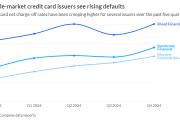
Ant, the company that operates Alipay, saw its quarterly profit fell 92% as the fintech pioneer founded by Jack Ma struggles to revive a business wracked by an economic downturn and more than a year of regulatory scrutiny.
The Hangzhou-based company contributed 80 million yuan ($11 million) of profit to Alibaba Group Holding. Based on Alibaba's one-third stake in Ant, that translates to an estimated 240 million yuan in profit for the fintech company's September quarter, according to Bloomberg calculations off the listed company's disclosures.
That compares with a
Alibaba attributed the decrease in Ant's profits to the "increase in Ant Group's net investment loss," while the operating profit was largely flat. A representative for Ant declined to comment further.
Beijing slapped more than $1 billion in fines on Ant and Tencent Holdings in July, reining in a pair of national champions that amassed data on hundreds of millions of people. Ant is awaiting a financial holding company license, which would pave the way for a revival of an
Ant proposed to buy back as much as 7.6% of its shares last year, giving investors a chance to reduce exposure to the firm. Under the repurchase plan, the company's valuation was
Investors including Warburg Pincus, Canada Pension Plan Investment Board, Carlyle Group and GIC Pte are among the top foreign shareholders that aren't participating in the buyback, Bloomberg
Ant is also preparing to
To look for growth, Ant is leveraging the payments network it built for Alipay to collaborate with digital wallets around Asia for transactions outside of their home markets.
Initially catering to Chinese tourists traveling outside the country, the company has expanded the service into a backbone for cross-border payments known as
Another budding source of revenue comes from Alipay+
Ant's Singapore digital wholesale bank also started
Ant
Chinese tech firms from Alibaba to Tencent and Baidu have joined startups Baichuan and Zhipu to release ChatGPT-like products, joining a global race to capitalize on the potential of generative AI. Ant, the owner of Alipay, can leverage the popularity of the mobile payment service to gain more data and insight on user habits.
In September, Ant





